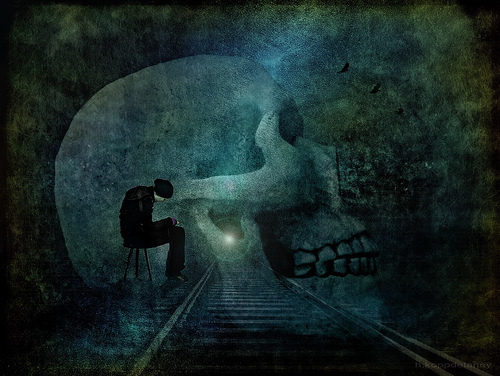When I was 14, I was depressed.
Some trigger was pulled. Maybe some chemicals didn’t fire right. But once the aggregate of hopelessness met that depressed threshold—I wore it like a lead apron.
I didn’t know it then, but my depression would define my life for the next 27 years.
Certainly, there were calm and happy intervals in those decades—but those moments were not the author of my life, like the deep, purple bruise of depression inside me.
Some days it would get pressed and send me to my knees in pain-riddled desperation. Other days it would just rest in the background but still have the power to stain my happiest days.
I thought about suicide—a lot—as in every single day of my life since I was 14.
Every. Single. Day.
That’s almost 10,000 days—a sublime Christmas with my family, did I think about it? Yes. The day I got married? Yes. The day I landed an amazing job taking me to an amazing town? Yes.
I never did attempt suicide, but to say that I did nothing about it is a lie. I researched the hell out of it. I looked into “exit bags,” gun placement for certain death, hanging, a cocktail of pills—you name it. I read about it.
I studied it because reading about it scratched some itch in me. It relieved enough pressure that it kept me from exploding.
It’s true I never did kill myself because my brain’s engaged in these dry runs. But equally true is that I never committed suicide because, the handful of times I was felt pressed to that point, there emerged some form of intervention. I would run into a friend to spend the day with. I would get an out-of-the-blue phone call from someone I hadn’t talked to in years.
Or I would find an old letter, or photograph, and get lost in some memory sufficient to distance myself from the acute pain and bottomlessness of that moment.
Sometimes, I would just hold my dog and cry.
By the time I turned 40, I was worse off than I had been when I was a depressed teenager. I had learned a lot about life and potential happiness along the way, but I was still hugely weighed down by that lead apron. I knew I needed to do something different. If I kept plodding along the same path, that path was sure to run out. I would have to make a drastic shift if I were going to survive my depression.
So I doubled my hours in therapy. I changed medications radically. I tried electro-convulsive therapy.
Finally, after a dizzying few months of these disruptive innovations, I have become able to accept and believe many of the truths that had just seemed like unattainable platitudes before:
I am not my mistakes. I am not my bad decisions.
Have I done terrible things in my life? Yes. Am I defined by those actions? No.
With this newfound acceptance, I have come to recognize a bit of irony in my life. I am a lawyer—a criminal defense lawyer at that. I represent poor people charged and convicted of crimes.
When people invariably ask how I can represent “those people” who have (often or sometimes) done terrible, horrific things—I always respond in the same way: “How would you like to be punished and forever judged by the worst thing you have ever done?”
Think about it—the worst thing you’ve ever done. Whether or not it is a criminal offense is irrelevant. We have all done terrible things. When looking at my clients, I see that they are whole people. They are not their mistakes. They are not their worst actions or poorest decisions.
As willingly as I was able to give these people the benefit of any doubt, I could not give myself that break for such a long time. Therefore, I am more grateful for that truth I am now able to embrace.
When I was depressed, I never understood how anyone else could not be depressed.
Seriously. Life was sh*t. The world was terrible and getting worse. So much pain out there. How could anybody be happy on a regular basis? I could not relate to it. With this foundation shaping me for nearly three decades, I am now having a minor identity crisis.
When I was depressed, I was open about it. It made me relatable. People felt safe to talk to me about their problems. They knew they didn’t have to be perfect and happy around me.
Now that I no longer identify as my depression, I am learning a new way to communicate who I am to people.
When I was depressed, people were also a touch more gentle around me. I was sensitive to them, and they were sensitive to me. Now I am learning what it is like to swim in the unfiltered world.
I’m learning—that was who I was, and this is who I am.
I have resolved that reminding myself daily with, “Jon, you must not let yourself become depressed again“—is unhelpful. Depression has defined much of my life thus far, and I believe that if I’m preoccupied by consciously avoiding it, depression will continue to define my life.
Instead, at any given point of the day, I have been trying to live the next five minutes of my life well. I am trying to avoid ruminating on the past or wondering about a necessarily unknown future.
I am not blissful. I am not blue. I am just—Jon, in this present moment.
A part of me knows I’ll likely have another downturn or maybe many more in my future. I’ll feel held under water. I’ll feel I’m drowning in hopelessness again. I hope these future episodes, should they come to pass, will be tempered by my recent revelation that I think of in terms of learning to breathe—to breathe deep, hopeful breaths.
When I feel like I’m drowning, I now have something to remind myself of.
“Jon, remember what it is like to breathe. You’re not drowning—you’ve breathed before. Just breathe.”
.
Relephant Read:
This is How We Start: 3 Steps Out of Depression.
.
Author: Jon Hunt
Editor: Yoli Ramazzina
Photo: Flickr/Hartwig HKD


 Share on bsky
Share on bsky





Read 2 comments and reply